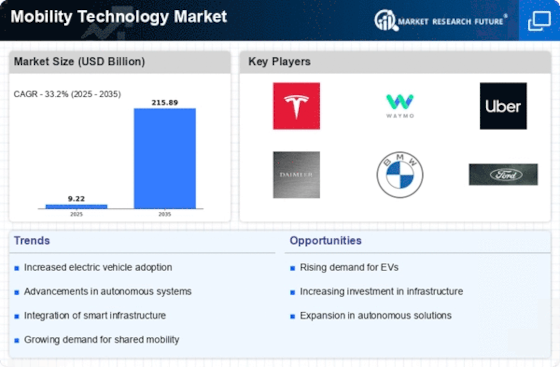Top Industry Leaders in the Mobility Technology Market

*Disclaimer: List of key companies in no particular order
Top listed global companies in the Mobility Technology industry are:
Qualcomm
Sierra Wireless
Samsung Electronics
Apple
Nuance Communication
Stmicroelectronics
Motorola Solutions
Texas Instruments
Atmel
Autotalks
Intel
Harris
Daifuku
Dematic
Bridging the Gap by Exploring Top Leaders Competitive Landscape of the Mobility Technology Market
The mobility technology market is a bustling metropolis of innovation, driven by a convergence of environmental concerns, changing consumer preferences, and rapid technological advancements. This dynamic landscape is home to a diverse range of players, each vying for a slice of the lucrative pie.
Key Player Strategies:
Traditional Automakers: Giants like Toyota, Ford, and General Motors are leveraging their established supply chains and brand recognition to pivot towards electric and hybrid vehicles. Partnering with tech companies for autonomous driving technology is another key strategy.
Tech Titans: Google, Apple, and Baidu are entering the fray with ambitious autonomous driving ambitions and innovative mobility service platforms. Their data-driven approach and expertise in software development position them as formidable contenders.
Startups and Disruptors: A burgeoning ecosystem of nimble startups is challenging established players with unique offerings. Companies like Tesla, Rivian, and Waymo are spearheading electric vehicle adoption and autonomous driving technologies with disruptive business models.
Mobility Service Providers: Uber, Lyft, and Ola are expanding their repertoire beyond ride-hailing, venturing into electric vehicle fleets and micro-mobility solutions like e-scooters and e-bikes. Their focus on shared mobility aligns with changing consumer preferences and urban sustainability goals.
Factors Shaping Market Share:
Technological Prowess: Leadership in electric vehicle battery technology, autonomous driving algorithms, and connectivity solutions will be crucial for differentiation and market share gains.
Brand Reputation and Trust: Established players and tech giants have an advantage in terms of brand recognition and consumer trust. However, disruptive startups can leverage innovative offerings and positive user experiences to build their own reputations.
Geographical Focus: Adapting strategies to regional regulations, infrastructure developments, and consumer preferences will be key for players to secure strong regional footholds.
Partnerships and Collaborations: Strategic alliances between automakers, tech companies, and service providers can accelerate innovation and overcome resource constraints, propelling them ahead in the competition.
Emerging Trends:
Vehicle-to-Everything (V2X) Communication: Seamless exchange of data between vehicles, infrastructure, and pedestrians promises enhanced safety and traffic efficiency, creating new avenues for growth in connected car technologies.
Multimodal Mobility Solutions: Integrating various modes of transportation like public transit, ride-sharing, and cycling into a single platform creates seamless commutes, attracting new customer segments and driving market expansion.
Personalization and Customization: Providing personalized mobility experiences tailored to individual needs and preferences will be a key differentiator, with AI-powered platforms playing a crucial role.
Focus on Sustainability: Continued emphasis on reducing carbon emissions through electric vehicles, renewable energy integration, and efficient transportation systems will shape future strategies and drive market growth.
Competitive Outlook:
The mobility technology market is a complex and ever-evolving ecosystem. Traditional players, tech giants, startups, and service providers are all jostling for position, employing diverse strategies and adapting to emerging trends. Success will depend on a combination of technological prowess, strategic partnerships, adaptability, and a focus on sustainability. The companies that can navigate this dynamic maze and deliver seamless, efficient, and personalized mobility solutions will undoubtedly emerge as the leaders of this transformative market.
Latest Company Updates:
Qualcomm:
- December 12, 2023: Collaborated with Ford on "5G to the Street" project for connected vehicles in Detroit (Qualcomm press release).
Sierra Wireless:
- January 19, 2024: Launched AirPrime HL8540 modem for industrial IoT and critical infrastructure applications (Sierra Wireless press release).
Apple:
- December 7, 2023: CarPlay announced at CES 2023 with support for multiple displays in new vehicles (Apple press release).
Nuance Communication:
- January 11, 2024: Launched Dragonfly voice assistant specifically designed for automotive use (Nuance press release).










